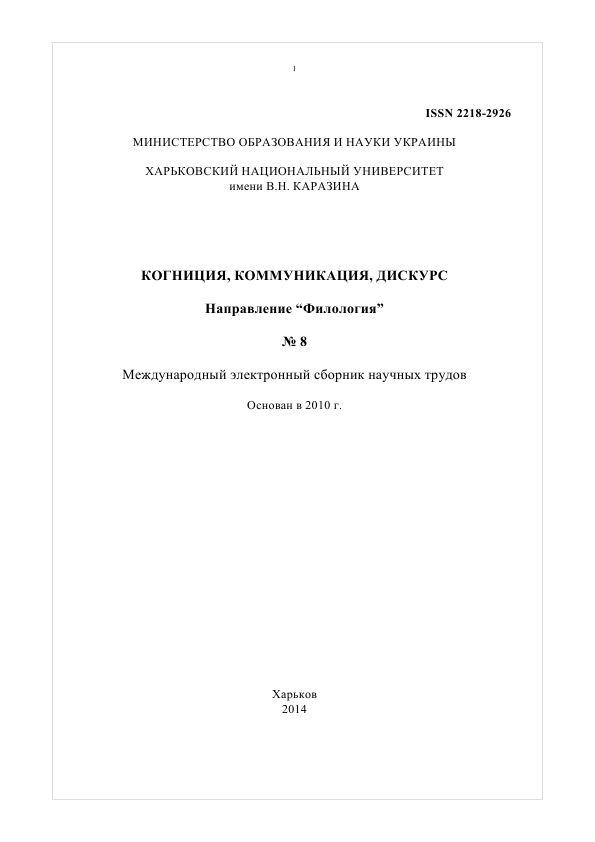Particularities of predicate verbalization of invariant meaning «have opinion» (on the material of Latin, Old Russian, French and Russian)
Abstract
The article deals with the question of predicate research from cognitive onomasiology positions in synchronic and diachronic sense. Semanticoonomasiological modulation of nominatheme meanings gives the possibility to provide more objective analysis of particularities of concept «thinking» predicate verbalization and to determine the similar and different specialties of paradigms building.
Downloads
References
Исхакова Р. Ф. Когнитивно-семантический анализ мнемических глаголов [Электронный ресурс]: автореф. дис. на соискание учен. степ. канд. филол. наук / Р. Ф. Исхакова. – Санкт-Петербург, 2009. – Режим доступа: www.spbu.ru/files/upload/disser/phylology/2009/ishakova.pdf
Кадоло Т. А. Русские ментальные глаголы в аспекте полиситуативности [Электронный ресурс]: дис. ... канд. филол. наук: 10.02.01 / Т. А. Кадоло. – Кемерово, 2004. – 189 c. – Режим доступа: www.lib.ua-ru.net/diplom/dcode-10.02.00--year-2004.html
Карлова Т.Є. Ономасіологічний клас предикатов «мислення» в синхронічному та діахронічному вимір [Текст]: дис. … канд. філол. наук: 10.02.15 / Т.Є. Карлова. – Донецьк, 2013. – 263 с.
Кондратенко Л. И. Глаголы интеллектуальной деятельности: На примере текстов прозы И. С. Тургенева: дис. … канд. филол. наук / Л. И. Кондратенко. – Воронеж, 2005. – 189 с.
Кузьмичева В. А. Фреймовая семантика в исследовании глаголов со значением социальной деятельности по достижению цели / В. А. Кузьмичева // Научный журнал Куб ГАУ, 2007. – № 33 (9). – Режим доступа: http://ej.kubagro.ru/2007/09/pdf/1./pdf
Небольсина М. С. Полиситуативный анализ семантики глаголов в контексте когнитивных исследований / М. С. Небольсина. – Режим доступа: www.uni-altai.ru/Journal/vestbspu/2002/gumanit/PDF/nebolsina.pdf
Плотникова А. М. Когнитивное моделирование семантики глагола [Электронный ресурс]: автореф. дис. на здобуття наук. ступеня доктора филол. наук (на правах рукописи) / А. М. Плотникова. – Екатеринбург, 2009. – 38 с. – Режим доступа:
elar.usu.ru/bitstream/1234.56789/1870/1/urgu0665s.pdf
Рогачева Ю. Н. Репрезентация фрейма «память» в современном английском языке: на материале глагольной лексики: дис. … канд. филол. наук / Ю. Н. Рогачева. – Белгород, 2003. – 182 с. – Режим доступа: http://www.lib.ua-ru.net/diss/cont/94047.html
Руденко Е. Н. Глаголы когнитивной деятельности русского языка // II Международный конгресс русистов-исследователей / Е. Н. Руденко. – Режим доступа: www.philol.msu.ru/.../psearch.php?...
Русская глагольная лексика: денотативное пространство: [монография / под общ. ред. Л. Г. Бабенко]. – Екатеринбург: Изд-во Урал. ун-та, 1999. – 460 с.
Теркулов В.И. Гештальтная семантика глагольной номинатемы / В.И. Теркулов // Язык.Текст.Дискурс: Научный альманах Ставропольского отделения РАЛК. – Ставрополь: Изд-во СГПИ, 2011. – С. 27-38.
Authors, who publish with this journal, accept the following conditions:
The authors reserve the copyright of their work and transfer to the journal the right of the first publication of this work under the terms of the Creative Commons Attribution License (CC BY), which allows other persons to freely distribute a published work with mandatory reference to the authors of the original work and the first publication of the work in this journal.
Authors have the right to enter into separate additional agreements for the non-exclusive dissemination of the work in the form in which it was published by this journal (for example, to post the work in the electronic institutions' repository or to publish as part of a monograph), provided that the link to the first publication of the work in this journal is given.
The journal policy allows and encourages the authors to place the manuscripts on the Internet (for example, in the institutions' repositories or on personal websites), both before the presentation of this manuscript to the editorial board and during review procedure, as it contributes to the creation of productive scientific discussion and positively affects the efficiency and dynamics of citing the published work (see The Effect of Open Access).




